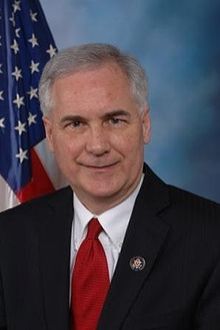These 9 Congressmen Refused to Consider Any Version of the Violence Against Women Act

After almost a year of resistance, House Republicans finally bowed down to the pressure and passed the Senate’s bipartisan reauthorization of the Violence Against Women Act (VAWA) on Thursday.
The House rejected a Republican version of the legislation before overwhelmingly voting in favor of the Senate version, The Hill reported. The GOP-sponsored bill contained watered-down protections for Native American women who are subjected to domestic abuse on tribal land, and does not extend the reach of domestic violence programs to aid individuals in same-sex relationships.
House Republicans have been the subject of fierce criticism for their previous refusal to reauthorize the bill, which was initially passed in 1994 (and authored by then-Sen. Joe Biden). Many maintain the Senate version, which allows tribal courts to prosecute non-Native Americans accused of domestic violence, is an unconstitutional expansion of tribal power.
The Senate passed the bill earlier this month in a 78 to 22 vote. Every female Republican voted in favor of the reauthorization.
The House passed the bipartisan bill in a 286 to 138 vote. Eighty-seven Republicans, including some House leaders, voted for it. However, Majority Leader Eric Cantor (VA) voted against it, while Speaker John Boehner (Ohio) did not vote.
But while many Republicans leaders were committed to extending the domestic violence protections included in the law, there were still some party members -- all men -- who refused to budge.
Reps. Paul Broun (Ga.), Scott Garret (N.J.), Louie Gohmert (Texas), Tim Huelskamp (Kan.), Walter Jones (N.C.), Steve King (Iowa), Thomas Massive (Ky.), Tom McClintock (Calif.) and Matt Salmon (Ariz.) all voted against a resolution to allow the House to even consider a vote on the bill.
Three of the men (Gohmert, Jones and King) had actually voted for the weaker Republican-backed bill last May, making their absolute opposition a surprise. However, so far none of the nine opponents have released a statement on the vote.
According to a letter Huelskamp sent to his constituents last year, after he voted against the GOP bill, the congressman said he does not believe the federal government has a role in funding domestic violence protection programs because it “should not be in the business of handing out grants conditioned on how states do or do not prosecute criminals.”
In 2012, McClintock called VAWA a “feel-good” law that is only adding to the government’s growing budget deficit.
“This is a feel-good measure that uses ‘Violence Against Women’ as an excuse to vastly expand a dizzying array of government grant programs, hamstring judges who are attempting to resolve and reconcile highly volatile relationships, add $1.8 billion to the nation’s debt and generally insinuate the federal government into matters the Constitution clearly reserves to the states. Federal grants of all kinds (essentially gifts of public money with little or no oversight) are out of control and ought to be abolished -- not expanded,” he wrote on his website.
The 1994 law expired last year. The act, in addition to providing funds to investigate and prosecute violent crimes against women, also imposes automatic and mandatory restitution on those who are convicted.
According to the White House, rates of intimate partner violence declined 67 percent between the law’s passage and 2010. Between 1993 and 2004, the rate of intimate partner homicides of females also decreased 35 percent, while the homicide rate for males fell 46 percent.
© Copyright IBTimes 2024. All rights reserved.





















